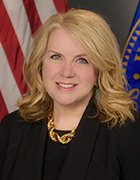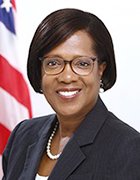
AlfaOlga/istock via Getty Images
CMS' whole-of-government approach to maternal health equity
HHS and its subagencies CMS, HRSA and SAMHSA are making strides in promoting maternal health equity, leaders said at a recent conference.
In all of her years in health policy, it never occurred to Carole Johnson, administrator at the Health Resources and Services Administration (HRSA), that CMS would be spearheading the charge to advance maternal health equity.
"I have been in health policy long enough to remember the days when CMS basically paid bills and listened to insurance companies and listened to providers," she told the audience at this year's CMS Health Equity Conference. "The idea that CMS is hosting a health equity conference is a testament to the leadership."
And yet, that was the scene last week, as the federal agency convened in Bethesda, Md., with healthcare stakeholders to explore the progress and best practices that have been established to address health equity.
During an opening panel, Johnson was joined by CMS Administrator Chiquita Brooks-LaSure and Miriam Delphin-Rittmon, Ph.D., the administrator for the Substance Abuse and Mental Health Administration (SAMHSA), to discuss the progress each agency has made toward eradicating maternal health disparities.
Like other health inequities, maternal health disparities have been a blight on the U.S. healthcare system for decades. The most recent figures from the CDC show that non-Hispanic Black women are 2.6 times more likely to die from pregnancy, childbirth or postpartum complications than their white peers.
The present focus on ending maternal health disparities is shared across the healthcare industry and across the government, Brooks-LaSure said. The leadership from the vice president's office has had a trickle-down effect on the rest of the cabinet and the HHS sub-agencies, like CMS, SAMHSA and HRSA, she noted.
Maternal health equity starts with coverage
According to the trio, the government's health equity work has been a triple threat, starting with coverage extension that has allowed pregnant people and their babies to obtain health insurance and keep that coverage during the postpartum period.
 Chiquita Brooks-LaSure,
Chiquita Brooks-LaSure,
administrator at CMS
"We are so excited that we now have 46 states that have expanded coverage postpartum," Brooks-LaSure said, referencing state-level efforts to provide Medicaid coverage after the required 60-day postpartum period.
Right now, 47 states (including Washington D.C.) have extended Medicaid postpartum coverage to 12 months via 1115 waivers. Idaho and Iowa are currently planning to implement 12-month postpartum coverage, and Wisconsin has limited coverage (90-day coverage extension).
To be sure, it's one of the top goals at CMS to ensure everyone has adequate health insurance coverage throughout their lives, Brooks-LaSure pointed out. But the postpartum coverage expansions are critical not just because of high maternal morbidity and mortality in the U.S. but also because of the logistical challenges to obtaining health insurance coverage that could be difficult for a new mom.
Expanding access to maternal healthcare
Postpartum Medicaid extension is only the first step in addressing maternal health disparities, Brooks-LaSure, Delphin-Rittmon and Johnson agreed.
 Carole Johnson,
Carole Johnson,
administrator at HRSA
"Your insurance card is only as good as having a high-quality place to use it," Johnson pointed out. "And that's where we come in. We at HRSA fund community health centers across the country, which see people regardless of their ability to pay. We are the backbone of maternal and child health services in every state in the country. We touch every newborn across the country. We are laser-focused on these issues."
The work at HRSA expands beyond whether a pregnant or postpartum person can get care into the type or quality of care that person receives. Right now, HRSA-funded community health centers are working on expanding access to prenatal care and maternal services, stressing the importance of cardiovascular health, the leading cause of maternal mortality for Black people.
The in-clinic work is being supplemented by social determinants of health (SDOH) work, Johnson added.
"It is not just about what happens in the clinic; it's about what happens in the community," she explained. "We've doubled the federal investment in home visiting. So nurses, social workers, parents and teachers can be in your home and help you in those early days up until preschool to be able to provide support."
HRSA most recently invested $100 million in Healthy Start, a program that supports community-based organizations that fill in the gaps for pregnant and postpartum people who need social support, like rides to prenatal appointments or funds to buy more diapers.
All of this is on top of the work HRSA is doing to address maternal mental health, which Johnson noted is the leading cause of maternal mortality. The agency has launched a maternal mental health hotline (833-TLC-Mama), plus provided different maternity care providers with the skills to address and refer for mental health concerns.
Spotlight shines on maternal mental health
According to Delphin-Rittmon, it's common for mental health to be left out of the conversation.
"I'm just so grateful that mental health is being incorporated into the maternal health conversation. We do find that sometimes it is overlooked," she said during the panel.
 Miriam Delphin-Rittmon, Ph.D.,
Miriam Delphin-Rittmon, Ph.D.,
administrator at SAMHSA
But maternal mental health is a leading problem in the U.S. One in eight women report symptoms of postpartum depression, according to the CDC. And yet, only one in five is asked about depression during prenatal visits, and only around half of pregnant or postpartum women get any treatment for depression.
Nevertheless, SAMHSA is focused on addressing maternal mental health, Delphin-Rittmon said, most recently by way of a maternal mental health task force.
"When we look at data, we see about 22% maternal deaths overall among individuals that are pregnant and postpartum," she said. "About 22% of those are related to mental health or substance use-related challenges and needs. So, the goal of the task force was to come together and put together strategies to address this."
To that end, the task force developed a national strategy for addressing maternal mental health, released just a week before the CMS Health Equity Conference.
Developed with an eye toward equity, Delphin-Rittmon said the resource includes a range of recommendations around early intervention, prevention and strategies for connecting people to needed services and supports to mitigate the maternal mental health problems that exist today.
Evolving the quality of maternal healthcare
According to Brooks-LaSure, it's not enough to expand insurance access and open clinics for care; ending maternal mortality and maternal health disparities will require a rethinking of the quality of care delivered.
"It's important to say that the disparities are not just education and income," Brooks-LaSure asserted.
"I can't tell you how many panels I've been on with women who look like me, who talk about their own experiences, who are highly educated, who have insurance," she continued. "We need to keep working to make sure that providers are listening to women, that we are picking up on the symptoms that we are hearing and addressing these underlying conditions, which often are the result of missed symptoms."
CMS is using the power of Medicare to move the needle via its new Birthing Friendly designation on the CMS Care Compare websites. Launched in November 2023, the Birthing Friendly designation flags hospitals and health systems that participate in a statewide or national perinatal quality improvement program and practice evidence-based care to improve maternal health.
"The Medicare program does not pay for that many births in America," Brooks-LaSure pointed out. "But when Medicare cares about something, people listen. Medicare desegregated hospitals in this country, and so it is a powerful tool. That's why I'm so excited about our Birthing Friendly designation because we are using the Medicare program to say, 'We are going to look at hospitals who have agreed to enroll in quality initiatives for maternal and infant treatment and really judge that.'"
HRSA is taking a community-based approach to cultural competency by leaning on community health workers and doulas to instill patient trust.
"It makes such a difference when there's someone to call and it's someone you trust, and often it's someone from your community who's had an experience like you," Johnson explained.
To be sure, enhancing medical education to create more trained OBs who can deliver culturally competent care is important, but other career pipelines are also needed.
"We've got to be investing in more doulas and more community health workers and creating career ladders for people from the community to be in this work with us together," Johnson recommended.
Delphin-Rittmon echoed that sentiment, saying that cultural competence, plus trauma-informed care, are at the core of maternal mental health efforts.
"There is a whole series of recommendations around paying attention to trauma and being trauma-informed, really taking a trauma-informed approach in terms of assessments, in terms of how treatments are developed and implemented, and to make sure that that is addressed as part of the care process for individuals," she explained.
"Ultimately, the goal is to have an eye toward equity to ask women about their cultural beliefs or their preferences and to have a greater understanding."
Getting to that goal is a matter of training, she added. Providers need to have greater awareness of the range of cultural beliefs, values and worldviews of the individuals who might be accessing care from them.
Implementing cultural competence training isn't a simple check-box, the trio agreed. Healthcare organizations need to contend with the already-packed schedules of their providers to conduct these trainings, and it can be difficult to create universal enthusiasm.
But still, the time is ripe, Johnson said, as the U.S. healthcare system finds itself at a crossroads.
"There's just a different awareness and a different level of we need to fix this, which I think is what you need to do to move the healthcare system in this country," she said, closing out the panel.
"There is so much more focus and a spotlight on maternal health and health equity more broadly. We have a tremendous moment and an administration that is not going to accept it and is so committed to making sure that we move the needle on, again, maternal health and other items that I think we will seize this moment and move to a better America."
Sara Heath has been covering news related to patient engagement and health equity since 2015.







